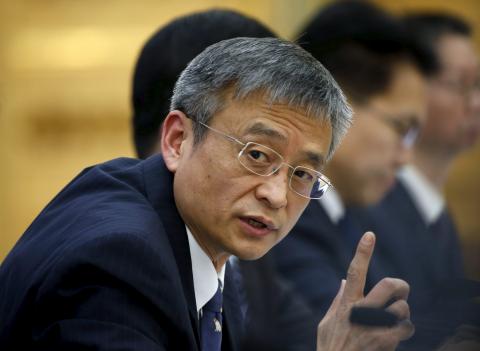China’s legislature approved an antiterrorism law on Sunday after months of international controversy, including criticism from human rights groups, business lobbies and US President Barack Obama.
Critics had said the draft version of the law used a recklessly broad definition of terrorism, gave the government new censorship powers and authorized state access to sensitive commercial data.
The Chinese government argued that the requirements were needed to prevent terrorist attacks. Opponents countered that the new powers could be abused to monitor peaceful citizens and steal technology secrets.

Photo: Reuters
In the end, the approved law, published by state media, dropped demands in the draft version that would have required Internet companies and other technology suppliers to hand over encryption codes and other operating sensitive data for official vetting before they went into use. However, the law still requires that companies hand over technical information and help with decryption when the police or state security agents demand it for investigating or preventing terrorist cases.
Telecommunication and Internet service providers “shall provide technical interfaces, decryption and other technical support and assistance to public security and state security agencies when they are following the law to avert and investigate terrorist activities,” the law stipulates.
“Not only in China, but also in many places internationally, growing numbers of terrorists are using the Internet to promote and incite terrorism, and are using the Internet to organize, plan and carry out terrorist acts,” Standing Committee of the Chinese National People’s Congress criminal law expert Li Shouwei (李壽偉) said at a news conference in Beijing.
The approval by the legislature, which is controlled by the Chinese Communist Party, came as Beijing has become increasingly jittery about anti-government violence, especially in the ethnically divided region of Xinjiang in western China, where members of the Uighur minority have been at growing odds with the authorities.
Chinese leaders have ordered security forces to be on alert against possible terrorist attack of the kind that devastated Paris in November.
Over the weekend, the shopping neighborhood of Sanlitun in Beijing was under reinforced guard by People’s Armed Police troops after several foreign embassies, including that of the US, warned that there were heightened security risks there around Christmas.
Human rights groups have warned that the law would give even more intrusive powers to the Chinese government, which already has broad, virtually unchecked authority to monitor and detain citizens and to demand information from companies and Internet services.
In an interview with Reuters in early March, Obama criticized the proposed legislation and similar initiatives by the Chinese government and warned that technology companies would not go along with the intrusive demands laid out in the draft law.
Li said that the new law was no reason for multinationals to be alarmed.
“These rules will not affect the ordinary business activities of the firms concerned,” he said.

MAKING WAVES: China’s maritime militia could become a nontraditional threat in war, clogging up shipping lanes to prevent US or Japanese intervention, a report said About 1,900 Chinese ships flying flags of convenience and fishing vessels that participated in China’s military exercises around Taiwan last month and in January last year have been listed for monitoring, Coast Guard Administration (CGA) Deputy Director-General Hsieh Ching-chin (謝慶欽) said yesterday. Following amendments to the Commercial Port Act (商港法) and the Law of Ships (船舶法) last month, the CGA can designate possible berthing areas or deny ports of call for vessels suspected of loitering around areas where undersea cables can be accessed, Oceans Affairs Council Minister Kuan Bi-ling (管碧玲) said. The list of suspected ships, originally 300, had risen to about

DAREDEVIL: Honnold said it had always been a dream of his to climb Taipei 101, while a Netflix producer said the skyscraper was ‘a real icon of this country’ US climber Alex Honnold yesterday took on Taiwan’s tallest building, becoming the first person to scale Taipei 101 without a rope, harness or safety net. Hundreds of spectators gathered at the base of the 101-story skyscraper to watch Honnold, 40, embark on his daredevil feat, which was also broadcast live on Netflix. Dressed in a red T-shirt and yellow custom-made climbing shoes, Honnold swiftly moved up the southeast face of the glass and steel building. At one point, he stepped onto a platform midway up to wave down at fans and onlookers who were taking photos. People watching from inside

Japan’s strategic alliance with the US would collapse if Tokyo were to turn away from a conflict in Taiwan, Japanese Prime Minister Sanae Takaichi said yesterday, but distanced herself from previous comments that suggested a possible military response in such an event. Takaichi expressed her latest views on a nationally broadcast TV program late on Monday, where an opposition party leader criticized her for igniting tensions with China with the earlier remarks. Ties between Japan and China have sunk to the worst level in years after Takaichi said in November that a hypothetical Chinese attack on Taiwan could bring about a Japanese

STREAMLINED: The dedicated funding would allow the US to transfer equipment to Taiwan when needed and order upgraded replacements for stockpiles, a source said The US House of Representatives on Thursday passed a defense appropriations bill totaling US$838.7 billion, of which US$1 billion is to be allocated to reinforcing security cooperation with Taiwan and US$150 million to replace defense articles provided to the nation. These are part of the Consolidated Appropriation Act, which the US House yesterday passed with 341 votes in favor and 88 against. The act must be passed by the US Senate before Friday next week to avoid another government shutdown. The US House Committee on Appropriations on Monday unveiled the act, saying that it allocates US$1 billion for the Taiwan Security Cooperation Initiative